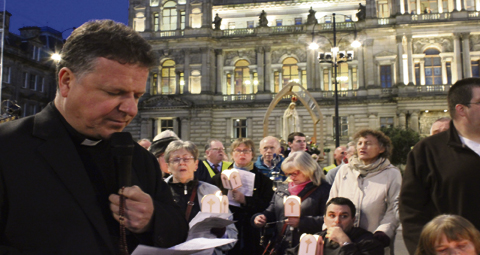BY Peter Diamond | June 7 | ![]() 0 COMMENTS
0 COMMENTS ![]() print
print

Government should ‘offer women practical support’ to avoid abortions
The Scottish Government should offer ‘practical support’ to women in crisis pregnancies rather than abortion, the Catholic Church has said as new figures show abortion is at a ten-year high in Scotland.
A spokesperson for the Scottish Bishops’ Conference said the increase in abortion is ‘a tragedy of enormous proportions for Scotland’ while the Bishop of Paisley said there is ‘always a better choice than abortion.’
Statistics for 2018 released last week showed a 6.7 per cent increase in the number of abortions performed last year with 13,286 abortions.
Practical support
“Rather than making access to abortion easier the Scottish Government should offer practical support to women so they don’t consider abortion,” the Church spokesperson said.
“Abortion is an attack on human life at its most vulnerable and defenceless—no society which permits it can call itself civilised.”
Technology
Responding to the new stats, Bishop John Keenan of Paisley Diocese argued that abortion increase could be down to ‘technology and the influence of social policy.’
“There are of course good effects of technology but some of the prevailing and ill effects relating to the issue is the ability to screen out children who have health issues, particularly in those children with Down’s syndrome,” he said.
“The second ill of technology is the morning after pill. We live in a society that suggests that ‘if it can be done, it should be done’ and that is not always correct.
“Technology is supposed to make society more humane but it can in fact make the world less humane.
“Perhaps one good use of technology is that the numbers of abortions in young women have gone down.
“That may be a result of the 3D images of the child in the womb and maybe young women are realising what we already knew, that a baby in the womb is far from just a clump of cells, it’s a human being.”
‘Red herring’
Bishop Keenan suggested that the debate over the Scottish Government offering abortion to women from Northern Ireland was a ‘red herring,’ as the number of women travelling to Scotland for abortions last year was less than 10.
However, he added that the policy ‘hasn’t helped the humane situation.’
The new stats show that women from deprived areas of Scotland are twice as likely to go through with having an abortion.
Giving hope
Bishop Keenan added: “We need better choices for women who live in poorer areas. Now is the time for politicians not to focus on politics but on real lives. They should be more humble and less ideological. These people need real hope.
“The Church will always be loud and clear and say there is always a better choice than abortion. That is our message to governments around the world.”
Home abortions
In 2018, nearly 30 per cent of medical abortions in Scotland involved self-administration of the drug misoprostol.
Michael Robinson, director of communications for pro-life charity SPUC Scotland, said: “At SPUC we still maintain that ‘DIY’ abortion can be detrimental to the mental and physical well-being of women in our country.
“Women should not be facing the mental anguish that accompanies ‘DIY’ abortions, nor any abortion for that matter.
“Society promotes abortion as a quick and easy fix for women facing unwanted pregnancy, but many post-abortive women will tell you that they had no choice at all.”
‘Concerning’ statistics
There were 34 abortions of babies with Down’s syndrome in Scotland in 2018. The 2018 number represents a 48 per cent increase from 23 in 2010.
Lynn Murray, spokeswoman for the Don’t Screen Us Out campaign, a coalition of Down’s syndrome advocacy groups, said that ‘as a mother of a 19-year-old daughter who has Down’s syndrome,’ the new stats were ‘deeply concerning.’
Responding to the stats, a Scottish Government spokesperson said: “All women in Scotland should have access to clinically safe abortion services within the limits of the law, should they require it.
Abortion care should be part of standard healthcare provisions and free from stigma.”










